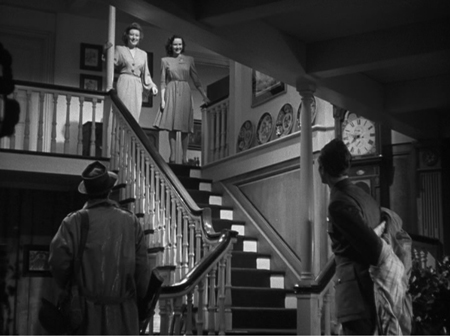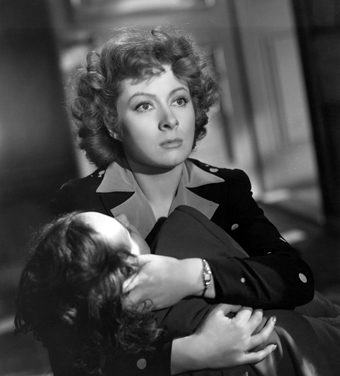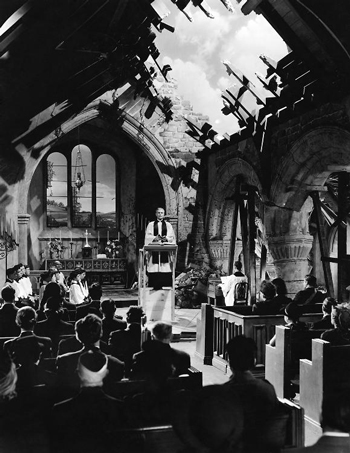
 |
|
|
|
Warner Home Video is reinvesting in the Blu-ray format this season, with a more energetic marketing drive on multiple fronts -- the new Warner Archive Collection Blu-ray program, double bills combining Warner and Paramount product, and more vintage WB library greats through normal channels, such as this old favorite. Director William Wyler's integrity and humanism shine through in almost all of his pictures. The morale booster Mrs. Miniver is more dated than some other films of the wartime period, but Wyler's expert hand with drama soon overshadows the film's sketchy messages and ersatz England-in-Hollywood tone. Excellent performances make a thin story honest and compelling. In some ways Mrs. Miniver is the 'before' film that complements Wyler's postwar masterpiece The Best Years of Our Lives. One shows a direct assault on the British public, and the other the sociological problems that accompany the American victory. 
The movie takes place in an England concocted on MGM's sound stages. Middle-class housewife Kay Miniver (Greer Garson) deals with petty problems. She and her husband Clem (Walter Pidgeon) watch her Oxford-educated son Vin (Richard Ney) court Carol Beldon (Teresa Wright), the charming granddaughter of the local nobility as represented by Lady Beldon (Dame May Whitty). Then the war comes. Vin joins the RAF and Clem mans his small boat to aid in the evacuation of Dunkirk. To her surprise, Kay is confronted with the enemy on her own doorstep. Mrs. Miniver begins on a note of supreme triteness. The charm and grace of Greer Garson ('discovered' by Louis B. Mayer on a pre-war trip to London) is oversold, and the English setting is never quite convincing. The propaganda aim was obviously to acknowledge and honor the courage and resolve of the British people. Unlike America, their cities and towns were directly bombed. Until the richly drawn characters and their problems take hold Mrs. Miniver is bad propaganda. An opening title card tells us that the Minivers are 'middle class' people, but what we see is a very well off architect's family that retains two domestic servants and sends its son to Oxford. Even bearing in mind MGM's tendency to sanctify and sanitize family life of any kind -- Andy Hardy being the ripe example -- Mrs. Miniver stoops to flatter the Minivers even when it pretends to criticize them. The opening scenes show Clem and Kay absorbed in petty luxuries, such as a fancy hat and a new car. This is supposed to make them seem even stronger when they face up to harder realities later in the story. The Minivers' beautiful house is nestled against the river, and Clem owns a private boat over thirty feet in length. Yep, that's real middle class living (if you're Louis B. Mayer). 1 Mrs. Miniver is pointedly designed to flatter our Allies, even though it was planned and begun before Pearl Harbor. Hollywood would later embarrass itself with Mission to Moscow, which rather shockingly endorses Stalinist show trials and purges. Miniver takes Hollywood's already healthy Anglo-philic tendency even further with its indulgence of the English class system. When young Oxford student Vin Miniver makes a pompous stand against Lady Beldon's privileges his criticism is judged as rash, hypocritical and most importantly, impolite. After all, Beldon's daughter does charity work! Lady Beldon's undisguised contempt for the commoners, the film proposes, is just how things are - she's a good egg beneath it all. Kay's tactful charm melts the Lady's resistance to an interfamily engagement. 
At the film's center is a competition for a prize rose, Mrs. Miniver's most annoying material. The contest is the kind of quaint and civilized activity those 'cultured' English are wont to pursue. Abandoning horticulture in wartime would be like conceding defeat to the Germans. There's a mawkish subplot with the cute & sexless Henry Travers (Clarence from It's a Wonderful Life) daring to put his rose in competition with Lady Beldon's, as by tradition she always wins. Henry Travers' character actually worships the leading lady from afar. Naming his rose the Mrs. Miniver sets up the class conflict, a mini-revolution. But according to this script the War has erased class barriers (pardon me while I fall down laughing, see I Know Where I'm Going!). The 'revolution' is quashed by a generous gesture from Her Ladyship, who of course only becomes more popular and beloved. The class system isn't really a class system... the villagers prefer unemployment and limited educational opportunities, and enjoy kowtowing to their hereditary superiors. (light spoilers)The superior dramatics of Mrs. Miniver overcome its artificial aspects. Kay and Clem see their entire world threatened and must fight and sacrifice to hold it together. All of the wartime content is underplayed with admirable restraint. Vin goes to battle but isn't lauded as an air ace. Clem participates in the Dunkirk evacuation, while a direct meeting between Kay and the enemy is concocted for a dramatic highpoint. Wyler's discipline makes it all believable -- the Nazi threats of the German flier (Helmut Dantine) can be partially chalked up to delirium. The natural strength and resilience of England are reinforced. Kay receives the enemy in her kitchen and overcomes him with polite hospitality. (spoilers from here on in)Greer Garson makes up in dignity what she lacks in excitement, being sort of a glamour girl 'in transition' to venerated motherhood. She and Walter Pidgeon are an okay pair and grate only when the script has them reacting to the 'amusing' antics of their clownish servants. The maid's jovial boyfriend (Rhys Williams of Our Man Flint) is welcomed in the Miniver household, yet is shown a milder version of the condescendsion reserved for black servants in even the classiest American movies of the time. The Minivers understand the status quo but place their family on a higher plane. When Kay goes all-out to pacify Lady Beldon on the subject of her son's engagement, it doesn't play as subservience. The drama comes through their adaptability to outside threats. Kay isn't in denial about the war, as Eliza Birdwell will be in Wyler's Friendly Persuasion. She sends her barely-adult son off to fight without protest. As his flying combat has an extremely high mortality rate, Kay defends Vin and Carol's need to be married without delay as a necessity of war. The film works because none of these threats are glamorized or overstated. Most Americans watching in 1942 immediately understood that the English civilians were on the front lines. Even the 'onward Christian soldiers' ending, with planes forming V's for Victory through the roof of a bombed church, doesn't mar the film's sincerity. Much of the heart in Mrs. Miniver comes via one of William Wyler's favorite actresses of the time, Teresa Wright. Exuding integrity and sincerity, Ms. Wright held her own against Bette Davis in The Little Foxes and was a standout in The Best Years of Our Lives. She also humanized Alfred Hitchcock's thriller Shadow of a Doubt. The emotional honesty of this propaganda picture can be seen in Ms. Wright's final scenes. 
Sharp eyes will easily find Ian Wolfe among the bit parts. Peter Lawford, Tom Conway and Miles Mander are said to be in there as well, but I didn't spot them. Ten years after their good DVD release, Warner has given Mrs. Miniver a sharp new Blu-ray transfer. The image is in great shape in every respect. Joseph Ruttenberg's slick cinematography represents the MGM standard, with extra finesse. The extras of the old disc have been carried over. The one new item is the crazy cartoon Blitz Wolf, where Tex Avery's version of the 3 Little Pigs go up against Hitler. In his first job for MGM, Avery packs the short subject with his wicked sense of humor. Two more wartime shorts show how Hollywood helped disseminate official war information -- and attitudes. For the Common Defense is an installment of the Crime Doesn't Pay series, and was clearly made as part of the U.S. campaign to foster good wartime relations with Latin America. Douglas Fowley scowls through his role as a Yank gangster who tries to smuggle counterfeit Axis money from Chile to Colombia for evil German and Japanese spies. Luckily, American counteragents John Litel and Van Johnson are on the job, along with unbilled Colombian cop Steven McNally. The presence of an Italian femme fatale gives equal time to all enemy flags. It's an entertaining simplification of the kinds of espionage that occurred in our 'neutral allies' to the South; the great spy story down there hasn't been written yet. The rumor-busting propaganda piece Mr. Blabbermouth! entertains with comedy schtick from actor Ralph Peters, as a morale-killer who spreads defeatist rumors. The narration rebuts his blab with facts about America's production superiority over its enemies. One clever extrapolation shows the Axis' postwar plans with a map of the U.S. divided into Japanese, German and Italian zones, just as in the Philip K. Dick novel Man in the High Castle. Italy apparently gets a parcel of southern swampland! The short is heavily laden with wartime racial slurs. It begins with the hysteria-driven false air raids over Los Angeles and San Francisco, just as in the comedy epic 1941. This is important history, and it is to Warners' credit that idiotic revisionism hasn't tried to sweep its un-P.C. content under the rug. Rounding out the disc's offerings are a handsome trailer and newsreel footage of Garson receiving her Oscar. The picture was nominated for a pile of awards and won for Best Screenplay, Best Director, Best Actress in both leading and supporting roles, Best Cinematography and Best Picture. William Wyler achieved this kind of royal flush of Oscars several times across his admirable career.
On a scale of Excellent, Good, Fair, and Poor,
Mrs. Miniver Blu-ray rates:
Footnote:
1. 'Middle Class' is of course a relative idea. In Latin America there are the fabulously wealthy, a tiny middle class that's really an upper-upper class, and the innumerable poor. The giant American middle class that was once so strong is being eroded away. Professionals with reasonably secure jobs and homes are now a real minority, with the rest of the country becoming, in all practical
ways, far poorer - the Wal-Mart majority. 'Middle Class' in pre-war England may be the proper term, if the middle is actually a fortunate minority. 2. From corresponent Jon Paul Henry, January 9, 2013: Hi Glenn -- I'm an Englishperson who emigrated to Canada decades ago, but I still have vivid memories of growing up in a class-bound society, where one's accent -- which was also class determined -- was enough to condemn one if it was deemed, by someone else, to be not the right sort. So is Mrs Miniver middle class? Well, yes and no. Yes, because she is not a member of the aristocracy. But also no, because if the family depicted is anything, it's more like a gentry family, notwithstanding its professional credentials, which is to say, a sprig of nobility in all but name. The ambiguity comes from the fact that the English class system, in full flower was never a simply three-level thing. George Orwell once described himself as a member of the lower upper middle class, which sounds silly, but which is actually spot on accurate. I was born middle class too, but as a member of the upper lower middle class, i.e., small tradespeople, lower middle management, that sort of thing. As for the film itself, I first saw it only a few years after I arrived in Canada, and hated it; too treacly and faked up, I thought, and incredibly remote from my experience of England. I haven't looked at it since, but suspect my reaction today would be much the same. I hope this clears things up. --- Jon Paul 3. From corresponent Dick Dinman, January 9, 2013: By the way your Miniver review pretty well sums up the reasons why you're the only online reviewer I religiously follow. My mother saw Miniver in London during the Blitz (at the Odeon Leicester Square??) when it first opened (the Nazis were considerate and there were no V-2 raids until roughly an hour after the screening was over) and she fondly remembered the supposedly reserved British audience laughing uproariously at M-G-M's idea of British "middle class" and the Hollywood-ized conception of the incredible travails the Brits were forced to endure. She also said there wasn't a dry eye in the house during Teresa Wright's death scene and loud and enthusiastic applause during the final scene in the bombed out Church. -- Dick Dinman
Reviews on the Savant main site have additional credits information and are often updated and annotated with reader input and graphics. Also, don't forget the 2011 Savant Wish List. T'was Ever Thus.
Review Staff | About DVD Talk | Newsletter Subscribe | Join DVD Talk Forum |
| ||||||||||||||||||